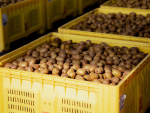Zespri is expecting this year to be one of its most challenging seasons it has faced, thanks to the impact of Covid across the global supply chain.
The kiwifruit marketer and exporter's chief global supply officer Alastair Hulbert told Hort News that the company is continuing to closely monitor the impact on its supply chain. He says they've completed picking and packing this season's Zespri Ruby Red Kiwifruit crop and have around 40% of SunGold Kiwifruit packed.
Zespri is also currently looking to increase Green volumes to meet its target demand for the early part of the season.
Hulbert says with the industry's labour shortage placing pressure on the kiwifruit sector - alongside a number of cost hike throughout its supply chain - Zespri's focus remains on looking after its people and doing everything it can to safely pick, pack and ship as much fruit as possible.
"To mitigate the impact of some of the challenges we face, this season we have implemented a series of operational changes," Hulbert told Hort News.
"Like adjusting incentives, pack types and shipping schedules to help maximise industry capacity and minimise the impact of the expected labour shortage and smooth out the supply of fruit. We know there will also be a range of market challenges this season, driven by the conflict in Ukraine, inflationary pressures and supply chain disruptions, as well as changes to fruit flows, leading to greater competition for shelf space and pressure on purchasing as we go through the year."
Hulbert says, from a shipping perspective, this season Zespri expects to use 72 charter vessels to help deliver its fruit to market. He says the company will be working with its longstanding partners to try and avoid much of the congestion they are continuing to see with global container shipping networks. As of 14 April, 10 charter reefer vessels have been loaded for the global markets including sailings to Japan, China and Europe, while the first liner to the US will depart next week.
"We're also closely monitoring and adapting to the ongoing disruption in Shanghai, which has widespread lockdowns in place in response to the recent increase in Covid-19 cases," Hulbert adds. "Our first fruit has arrived in China at Taizhou Port, which is a new partnership aimed to support our supply chain and discharging of fruit has been smooth. The lockdown is disrupting supply chains in China, and we do expect to see an impact on early season logistics."

















